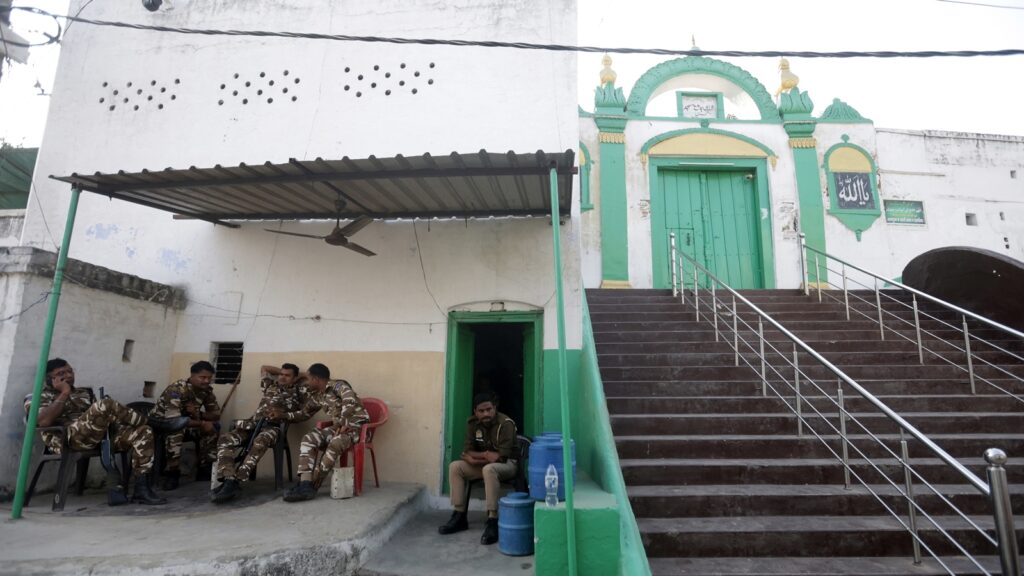On Friday, the Supreme Court ordered the Uttar Pradesh government to maintain unity and calm in Sambhal while preventing a local court from taking further steps on the Shahi Jama Masjid survey until January 8. It stated that the petition would be posted within three days and asked the Mosque Committee to file a case against the local court’s survey order before the high court.

According to the top court, the survey-based report from the advocate commissioner must likewise be kept private. “We hope and trust the trial court would not take any further steps in the matter until the high court takes up the proceedings in relation to the matter and passes suitable orders”.
Days after violence broke out during the survey on November 24, killing four persons, the matter was heard by the Supreme Court. Devendra Kumar Arora, a retired judge of the Allahabad High Court, was appointed late Thursday night by the Uttar Pradesh government to lead a three-member committee that would look into the violence.
The Shahi Jama Masjid was constructed on the site of a “Harihar Temple”, according to a lawsuit filed on November 19 in Smabhal’s civil court by eight plaintiffs, including Supreme Court lawyer Hari Shankar Jain. The sought access to the site, referring to it as a temple.
Similar lawsuits have been launched by Jain and his son, advocate Vishnu Shankar Jain, against Shree Krishna Janmabhoomi-Shahi Idgah in Mathura and the Gayanvapi mosque in Varanasi, which is next to the Kashi Vishwanath temple.
On the day the lawsuit for the mosque’s photographic and videographic survey was filed, the advocate commissioner was appointed by the local court. The order was passed ex parte. The mosque administration was not notified and the survey was completed in a matter of hours. Five days later, with hardly six hours’ notice to the mosque committee, another poll is conducted.
The mosque’s management committee petitioned the Supreme Court for an urgent halt to the survey. It made the case that these surveys, especially of historically significant houses of religion, would worsen intercommunal conflicts and threaten the secular foundation of the nation. The plea questioned the survey’s validity and order.
In order to stop more communal conflict and uphold judicial propriety when addressing delicate disputes involving ancient places of worship, the plea, which eschewed the Allahabad high court, calls on the Supreme Court to step in directly.
According to appeal, these measures were adopted in excessive haste and without giving the committee a chance to challenge the order or pursue remedies.
It contended that the case was in violation of the Places of Worship (Special Provisions) Act, 1991, which forbids altering the nature of a house of worship as it was on August 15, 1947. It referenced the 1958 Ancient Monuments and Archaeological sites and Remains Act, which guards against abuse or damage of ancient places of worship.
The petition drew attention to procedural errors in the civil court’s ruling, such as the survey’s lack of justification or terms of reference. It implied that these surveys are being ordered more frequently in conflicts over houses of worship, which could exacerbate feelings within the community.
On November 22, the Supreme Court recognized the need to decide whether a lawsuit filed by a group of Hindu women seeking the right to worship Hindu deities inside the Gyanvapi mosque complex was legally maintainable under the Places of Worship Act, 1991. The mosque management committee has contended that, with the exception of the Ayodhya Ram Janmabhoomi-Babri Masjid issue, all suits are precluded by the 1991 Act, which freezes the religious nature of all places of worship as of August 15, 1947. Since March 2021, the Supreme Court has been considering a number of petitions calling for the repeal of the 1991 Act and strict implementation of the law.
Read Also: Man Acquitted of Official Secrets Act Charges for Filming Inside Police Station